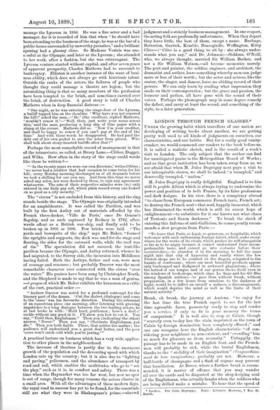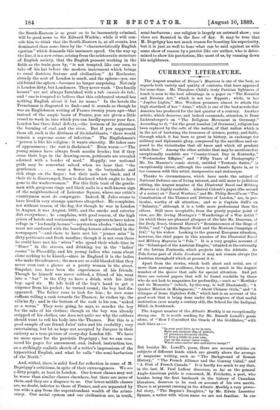LONDON LtIttOUGH FRENCH GLASSES.* - UNDER the growing habit which
travellers of one nation are
developing of writing books about another, we are getting pretty well used to all kinds of judgments on ourselves, our characteristics, and our habits. But for a really good vanity- crasher, we would commend our readers to the book before us.
It is called a realistic sketch, and is the result of a week's visit to London. The only subject that the author can find for unmitigated praise is the Metropolitan Board of Works ; and as that great institution has been taken away from us, we are afraid that when M. Jules Degregny next pays a visit to our inhospitable shores, we shall be indeed " a trampled," and deservedly trampled, "nation."
M. Jules Degregny is really delightful. England is to him still la perftde Albion which is always trying to undermine the power and position of la belle France, by its false professions and dark designs. In his view, there is a conspiracy abroad "to chase from European commerce French taste, French art; to destroy the French soul—that soul, happily immortal, which has illuminated the world, which is still its surest hope of enlightenment—to substitute for it one knows not what chaos
of Teutonic and Saxon darkness." To break the shock of entering this Inferno of anti-Gallicism, he consequently recom- mends a slow progress from Paris
"To leave that Paris, so loyal, so generous, so hospitable, which welcomes with such enthusiasm foreign talent, which seeks every- where for the works of its rivals, which pushes its self-abnegation so far as to be angry because it cannot understand their incom- prehensible taste, and cannot go into ecstasies before their eccentricities,—to abandon it in the morning, to fall the same night into that city of hypocrisy and vanity where the few French shops are to be counted on the fingers, relegated to the haunts of courtesans ; where our most beautiful products appear only burlesqued and disfigured in awkward plagiarisms ; where the hatred of our tongue and of our genius shows itself even in the windows of book-shops, which class Le Sage and his Gil Bias among Spanish authors,—to pass thus without break, without preparation, in a few hours from sunshine to the darkness of night, would be to inflict on oneself a sadness, a discouragement, which would deprive the mind as well as the limbs of their natural activity."
Break, oh break, the journey at Amiens, "to enjoy for the last time the true French esprit, to see for the last
time agreeable faces, passers-by ready to stop and render you a service, if only to fix in your memory the terms of comparison." It is well also to stop at Calais, though "scarcely even to-day has the stain imprinted on the town of Calais by foreign domination been completely effaced ;" and one can recognise here the English characteristic "of con- sidering your neighbour as non-existent, and 'crowding' him as much for pleasure as from necessity?' Unhappily, the passage has to be made in an English boat, and the French- men will probably be sick, while the brutal Englishmen,
thanks to the "stolidity of their imagination" (rengourdisse- ment de leur imagination), probably are not. However, a
half-bottle of champagne and a flask of cognac may prevent that humiliation. At Dover, where a further break is recom- mended, it is matter of offence that you may wander all over the castle and be disgusted at the shop-keeping soul of the Englishman, who actually laughs when the soldiers who are being drilled make a mistake. To hear that the speed of
• Lomires. Par Jules Degagny. Paris : Librairie Morlerne, 7 Rue St. Benoit. the South-Eastern is so great as to be insensately criminal, will be good news to Sir Edward Watkin ; while it will con- sole him to think that the South-Eastern is, at all events, less dominated than some lines by the "characteristically English egotism" which demands this insensate speed. On the way up the line, it is a new crime, arising from the aristocratic structure of English society, that the English peasant working in the fields as the train goes by, "is not tempted, like our own, to take off his hat before the modern instrument which brings to rural districts fortune and civilisation." At Rochester, already the soot of London is smelt, and the spleen—yes, our old friend the spleen—becomes no longer surprising. Not only is London dirty, but Londoners. They never wash. "Des family houses" are not always furnished with a tub (mania du tub), and "one is tempted to believe that this celebrated utensil has nothing English about it but its name." In the hotels the Frenchman is disgusted to find—and it sounds as though he was an Englishman writing of France twenty years ago—that instead of the ample basin of France, you are given a little vessel to wash in, into which you can hardly squeeze your face. London has three fatal defects,—the lowness of its situation, the burning of coal, and the river. But if you suppressed them all, such is the dirtiness of its inhabitants, "there would remain a supreme cause of infection." The Englishman's
"person is like his religion : it wants sincerity. He takes care of appearances ; the rest is disdained." Even worse :—" The young misses have always fresh muslin frocks ; but if they cross their legs in the drawing-room, petticoats are revealed adorned with a border of mud." Happily, our national pride may be somewhat salved when we hear that "the
gentlemen wear a flower in the buttonhole and rich rings on the finger ; but their nails are black, and if their tie is disarranged, linen is disclosed which ought to have gone to the washerwoman." For this little trait of the gentle- man with gorgeous rings and black nails is a well-known sign of the neighbourhood of Leicester Square, where our critic's countrymen most do congregate. Indeed, M. Jules seems to have lived in very strange quarters altogether. He complains, not without reason, of the fog (for though he was in London in August, it was August, 1888), and the smoke and exterior dirt everywhere ; he complains, with good reason, of the high prices of hotels and restaurants ; and he appears to have taken refuge in " les family-houses "—mysterious abodes "which one must not confound with the boarding-houses advertised in the newspapers "—and there to have met his " jeunes miss" in dirty petticoats and fresh muslins ; though it is not even there he could have met his " wives " who spend their whole time in " firmer " in the streets, and drinking tea in the "ladies' rooms" in Piccadilly, and his young ladies who roam about alone seeking to be kissed,—since in England it is the ladies who make the advances ; the men are so cold-blooded that they never even cast a glance at a pretty woman in the street. Singular, too, have been the experiences of his friends. Though he himself was never robbed, a friend of his, went into a " bar " in the City to have a drink, with his little boy, aged six. He left hold of the boy's hand to get a sixpence from his pocket; he turned round ; the boy had dis- appeared. The father runs to look for him ; he sees some ruffians rolling a cask towards the Thames; he rushes up; the villains fly; and in the bottom of the cask is his son, "naked as a worm." They were going, he says, to murder the boy for the sake of his clothes ; though as the boy was already stripped of his clothes, one does not quite see why the robbers should want to roll his body into the Thames. But this is a good sample of our friend Jules' tales and his credulity; very entertaining, but let us hope not accepted by Jacques in their entirety is a true picture of every-day London life. We have no more space for the patriotic Degregny ; but we can com- mend his pages for amusement, and, indeed, instruction too, as a strikingly realistic sketch of a writer's impressions of the hypocritical English, and what he calls "the semi-barbarism of the North."
And, withal, there is solid food for reflection in some of M. Degregny's criticisms, in spite of their extravagances. We are a dirty people, at least in London. Our lowest classes may not be worse than similar classes elsewhere, but there are more of them, and they are a disgrace to us. Our lower-middle classes are, no doubt, inferior to those of France, and are separated by too wide a gap from the superabundant wealth of the aristo- cracy. Our social system and our civilisation are, in truth,
semi-barbarous ; our religion is largely an outward show ; our vices are flaunted in the face of day. It may be true that M. Degregny has not much reason for boasting his superiority, but it is just as well to hear what can be said against us with some show of reason by a patriot like our author, who is deter- mined to show his patriotism, like most of us, by running down his neighbours.



































 Previous page
Previous page